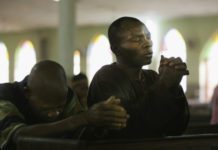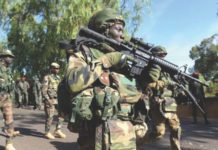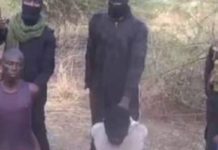By BosNewsLife Africa Service
 BANGIU, CAR (BosNewsLife)– Christians in the Central African Republic (CAR) have been plunged into mourning after a pastor was killed and his church demolished in the latest outbreak of violence, while thousands of Christians were forced to flee their homes.
BANGIU, CAR (BosNewsLife)– Christians in the Central African Republic (CAR) have been plunged into mourning after a pastor was killed and his church demolished in the latest outbreak of violence, while thousands of Christians were forced to flee their homes.
The United Nations said at least three people were killed and 26 injured, including civilians and combatants, in the February 7 incidents.
Elsewhere, outbreaks of infighting between Muslim factions caused thousands of Christians to flee their homes in the north of the country, said the news agency of Christian aid and advocacy group Open Doors.
The news agency, World Watch Monitor (WWM), reported that in the latest clashes Pastor Jean-Paul Sankagui of the Eglise du Christ en Centrafrique (ECC) was among those killed by supporters of local militia leader Youssouf Sy, also known as the “Big-man”, at his home in the restive PK5 neighbourhood.
The violence reportedly followed a military operation there by the CAR army and UN peacekeeping forces. They wanted to interrogate Sy, but he was killed, together with an associate, Christians said. In retaliation, Sy’s supporters went on a rampage, injuring and killing people, including the pastor, and destroying property, explained the President of the ECC, Jean Noel Ndanguere, in published remarks.
CHURCHES ON FIRE
Sankagui’s church was set on fire, as was the Apostolic and St Mathias Church, WWM reported.
Last month, a tent set up as a temporary place of worship by the Baptist Union of Churches’ Gbaya Dombia congregation was reportedly also burnt down. The tent had been erected after the church’s previous building was burnt down in 2014.
Twice in the past week, armed individuals also entered the local hospital with the aim of killing patients. A senior UN official condemned the attacks.
PK5 is part of the 3rd district in Bangui and the last remaining predominantly Muslim neighbourhood. Gbaya Dombia’s pastor quoted Muslims as saying that Christians would not be allowed a meeting place in the area until Muslims have returned to the area and reopened their mosques.
The violence has added to anxiety among Chistians. Hundreds of internally displaced people, shaken by the renewed violence, recently returned to the refugee camp at Bangui M’Poko Airport, where they sought refuge when the violence first erupted in 2013. Since December last year, people had slowly begun to return to their abandoned homes, Christians said.
“The incident took place following a military operation. Then militiamen started shooting. They burnt down our houses. These armed men must be disarmed,” one displaced person reportedly said, speaking on condition of anonymity.
REBEL GROUPS
While the army, with the support of 10,000 UN peacekeepers, could somewhat stabilize the situation in the capital, in more rural areas rebel groups are holding local populations hostage, according to Christians familiar with the situation. Only a few days before the incident in Bangui, up to 9,000 people, many of them Christians, were forced out of their homes after rebel infighting in the northern town of Bocaranga – part of the Ouham Pende province, WWM said.
The UN reported that people fled into the bush after violence erupted between two unnamed armed groups. In the clashes, international compounds of non-governmental organizations were attacked and pillaged and at least one office was burnt down, media reported. Shops and markets were “systematically pillaged,” as was a church, according to UN officials.
On 2 February, clashes between two Séléka factions over a gold mine near Bambari caused renewed displacement, swelling numbers and worsening the already difficult conditions in refugee camps.
The Central African Republic is facing a difficult internationally supervised transition. Faustin-Archange Touadera, a former prime minister and maths professor, was declared the winner of a presidential election in February 2016. The vote was seen as crucial to turning the page on years of sectarian violence.
He served as the last prime minister of ex-president Francois Bozizé who was deposed in a 2013 coup by a coalition of Muslim-dominated rebel groups. The ouster of Bozizé, a Christian, by the mostly Muslim Seleka rebels sparked a spiral of violence between Muslim and religious Christian militias that left thousands dead, and many voters expressed a strong desire for peace when they cast their ballots.








